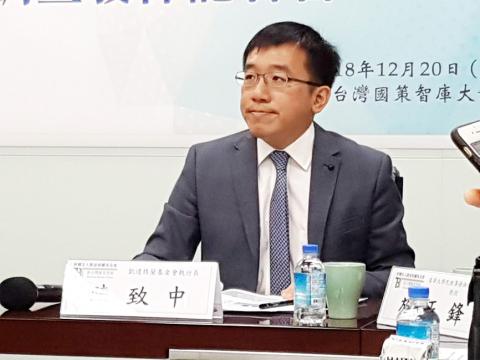Most Taiwanese would not support a re-election bid by President Tsai Ing-wen (蔡英文), but would support Premier William Lai (賴清德) if he represents the Democratic Progressive Party (DPP) for the nation’s top office in 2020, a survey published yesterday showed.
The poll, conducted by the green-leaning Taiwan Brain Trust think tank from Wednesday to Friday last week, gauged voter preferences for the 2020 presidential race after the DPP’s landslide losses in the Nov. 24 nine-in-one elections.
The poll found that Tsai’s disapproval rating has climbed 12 percentage points from a similar survey by the think tank in July to 66.8 percent, while her approval rating has dropped to only 19 percent.

Photo: Hsieh Chun-lin, Taipei Times
While 45.7 percent of respondents said they would not vote for a DPP presidential candidate in 2020, the number rose to 66.3 percent when asked if they would support a re-election bid by Tsai, compared with 22.4 percent who said they would.
Meanwhile, public support for Lai appeared to be noticeably higher than that of Tsai.
Asked to select their preferred DPP presidential candidate for the 2020 election, 56.5 percent of respondents picked Lai and 17.3 percent chose Tsai, while 26.2 percent preferred neither, the survey found.
The think tank also put Tsai and Lai in a hypothetical two-legged race against three potential Chinese Nationalist Party (KMT) presidential candidates: KMT Chairman Wu Den-yih (吳敦義), outgoing New Taipei City Mayor Eric Chu (朱立倫) and Kaohsiung mayor-elect Han Kuo-yu (韓國瑜).
Tsai would receive 41.4 percent of votes if running against Wu (29.4 percent), with her support dropping to 32.3 percent and 27.8 percent if up against Han (48.7 percent) and Chu (53.6 percent) respectively, the survey found.
The margins would narrow significantly if the DPP nominates Lai, who would receive 41 percent and 41.6 percent of votes if facing Chu (43.8 percent) or Han (43.5 percent) respectively, the poll found.
The premier would easily defeat Wu with 60.3 percent of support against the KMT chairman’s 19.9 percent, it found.
However, independent Taipei Mayor Ko Wen-je (柯文哲) appeared to be the strongest presidential candidate, as the survey found that he would win in all hypothetical scenarios if he enters the race against the projected DPP and KMT candidates.
The tightest race would be a three-legged election between Ko, Chu and Lai, who garnered the support of 34.3 percent, 29.5 percent and 28.2 percent of respondents respectively, the poll found.
The survey collected 1,072 valid samples. It has a confidence level of 95 percent and a margin of error of 3 percentage points.

DAREDEVIL: Honnold said it had always been a dream of his to climb Taipei 101, while a Netflix producer said the skyscraper was ‘a real icon of this country’ US climber Alex Honnold yesterday took on Taiwan’s tallest building, becoming the first person to scale Taipei 101 without a rope, harness or safety net. Hundreds of spectators gathered at the base of the 101-story skyscraper to watch Honnold, 40, embark on his daredevil feat, which was also broadcast live on Netflix. Dressed in a red T-shirt and yellow custom-made climbing shoes, Honnold swiftly moved up the southeast face of the glass and steel building. At one point, he stepped onto a platform midway up to wave down at fans and onlookers who were taking photos. People watching from inside

A Vietnamese migrant worker yesterday won NT$12 million (US$379,627) on a Lunar New Year scratch card in Kaohsiung as part of Taiwan Lottery Co’s (台灣彩券) “NT$12 Million Grand Fortune” (1200萬大吉利) game. The man was the first top-prize winner of the new game launched on Jan. 6 to mark the Lunar New Year. Three Vietnamese migrant workers visited a Taiwan Lottery shop on Xinyue Street in Kaohsiung’s Gangshan District (崗山), a store representative said. The player bought multiple tickets and, after winning nothing, held the final lottery ticket in one hand and rubbed the store’s statue of the Maitreya Buddha’s belly with the other,

‘COMMITTED TO DETERRENCE’: Washington would stand by its allies, but it can only help as much as countries help themselves, Raymond Greene said The US is committed to deterrence in the first island chain, but it should not bear the burden alone, as “freedom is not free,” American Institute in Taiwan Director Raymond Greene said in a speech at the Institute for National Defense and Security Research’s “Strengthening Resilience: Defense as the Engine of Development” seminar in Taipei yesterday. In the speech, titled “Investing Together and a Secure and Prosperous Future,” Greene highlighted the contributions of US President Donald Trump’s administration to Taiwan’s defense efforts, including the establishment of supply chains for drones and autonomous systems, offers of security assistance and the expansion of

Japan’s strategic alliance with the US would collapse if Tokyo were to turn away from a conflict in Taiwan, Japanese Prime Minister Sanae Takaichi said yesterday, but distanced herself from previous comments that suggested a possible military response in such an event. Takaichi expressed her latest views on a nationally broadcast TV program late on Monday, where an opposition party leader criticized her for igniting tensions with China with the earlier remarks. Ties between Japan and China have sunk to the worst level in years after Takaichi said in November that a hypothetical Chinese attack on Taiwan could bring about a Japanese